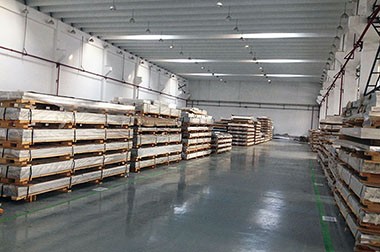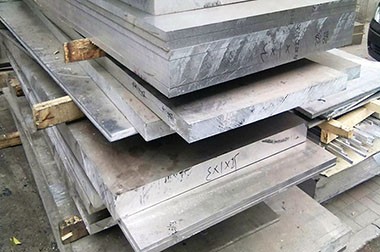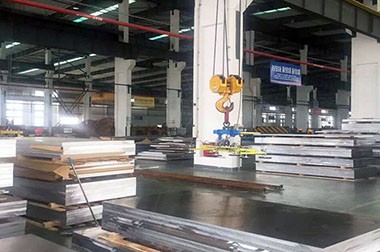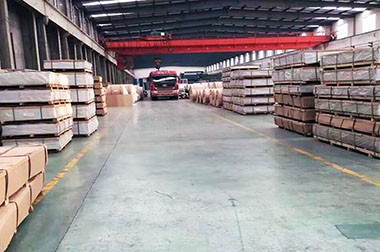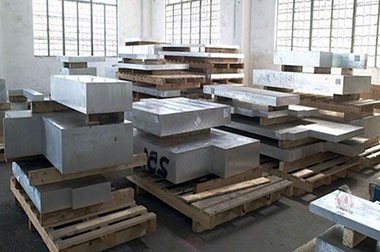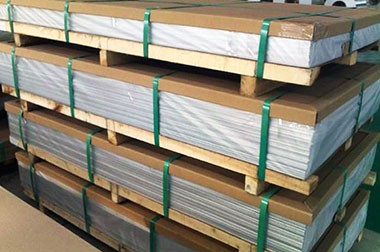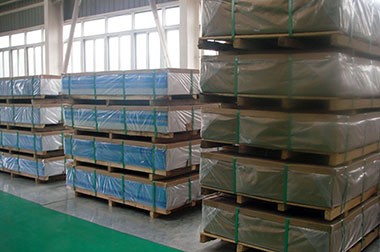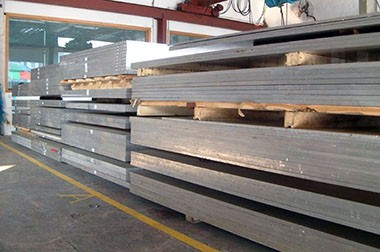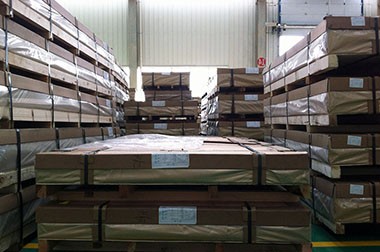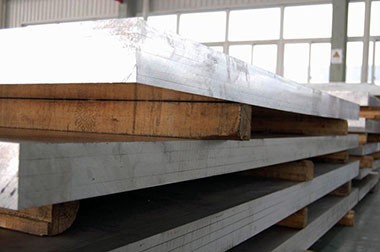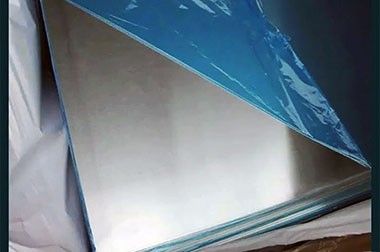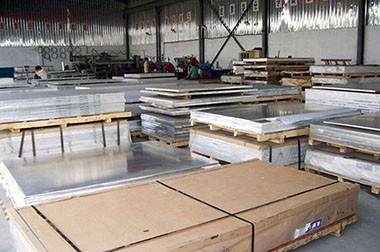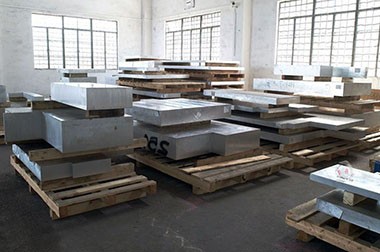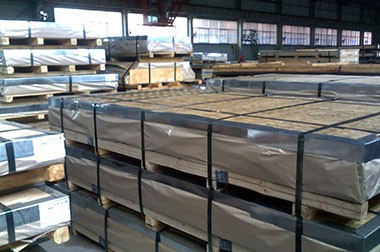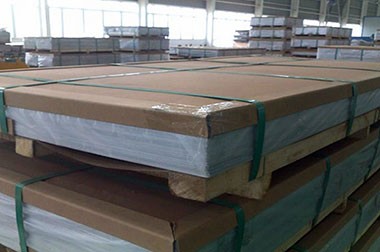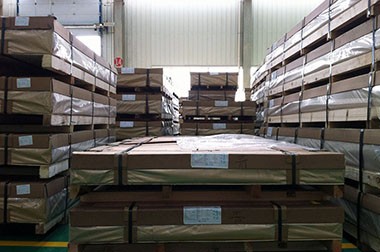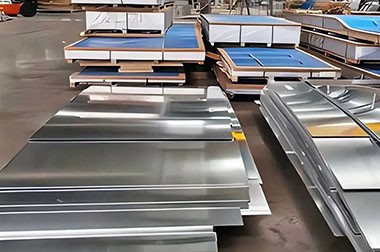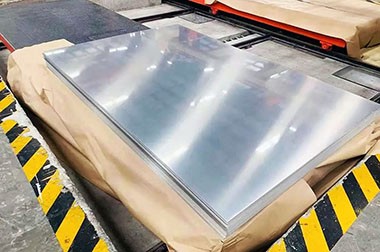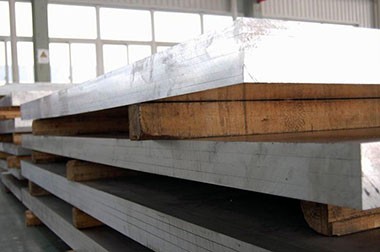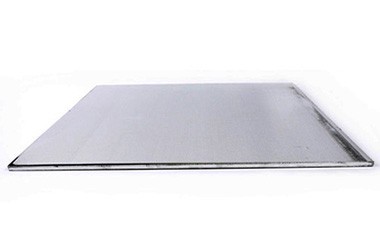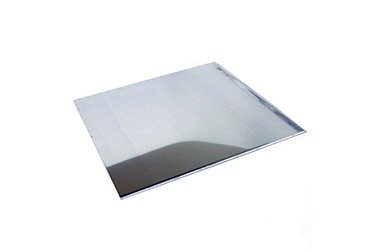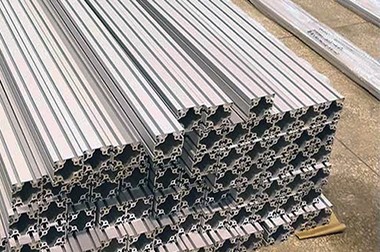7049 T73 T7352 Aerospace Aluminum Plate
7049 aluminum is a high-strength forging alloy in the 7000 series, primarily made of zinc, with significant amounts of magnesium, copper, and a small amount of chromium. 7049 aluminum can be heat-treated and is known for its excellent strength-to-weight ratio.
The UNS name for 7049 aluminum alloy is A97049, and it is highly regarded for its excellent stress corrosion cracking resistance and high tensile strength. It is commonly used in critical aerospace applications, such as main landing gear and missile components, where durability and high strength-to-weight ratio are crucial.
7049 aerospace aluminum plate is a high-strength, corrosion-resistant aluminum alloy primarily used in aerospace and military fields. It has excellent mechanical properties and stress corrosion cracking resistance. Its composition is based on aluminum, with added zinc, magnesium, copper, and chromium alloying elements, giving 7049 aluminum alloy superior mechanical strength and corrosion resistance, making it particularly suitable for use in harsh environments.
7049 aluminum alloy, due to its high strength, corrosion resistance, and stress corrosion cracking resistance, is widely used in aerospace, military, and high-performance industrial applications due to its excellent mechanical performance, corrosion resistance, and crack resistance.
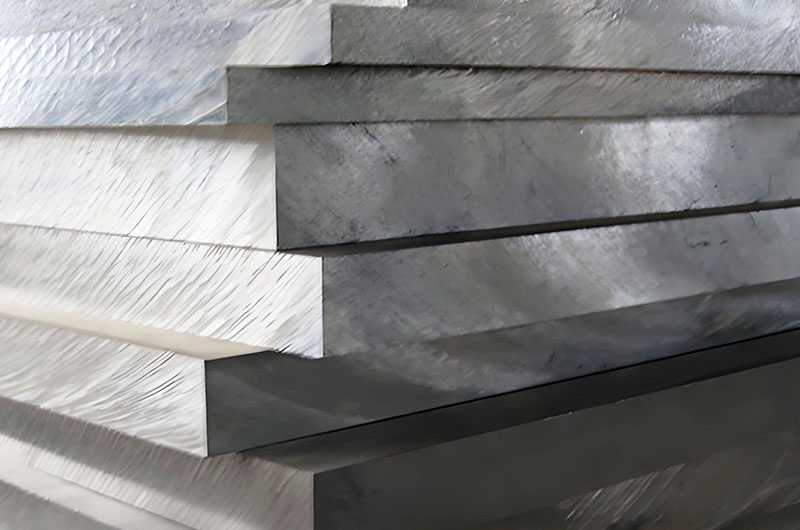
Informations about 7049 Aluminum
| Feature | Details |
| Principal Design Features | 7049 is a forging alloy, heat treatable with excellent resistance to stress corrosion cracking. |
| Applications | Primarily used for structural forgings in the aircraft and missile industries. |
| Machinability | Good machinability in the heat-treated state. Use of oil lubricants is recommended during machining. |
| Forming | Not suitable for cold forming. Forming is done by hot forging or hot forming. |
| Welding | Welding should be avoided. Tungsten inert gas welding may be possible, but not recommended. |
| Heat Treatment | Solution heat treatment at 875°F, followed by water quenching. Aging can be performed after heat treatment. |
| Forging | Forging is performed within a narrow temperature range of 820°F to 720°F. |
| Hot Working | Hot working is done in the same temperature range as forging: 820°F to 720°F. |
| Cold Working | Cold working should not be done. |
| Annealing | Not applicable, as this alloy is not cold worked. |
| Tempering | Not applicable. |
Characteristics of 7049 Aerospace Aluminum Plate
- High Strength and Corrosion Resistance: 7049 aluminum alloy offers excellent tensile strength and corrosion resistance, especially performing well in extreme environments. Its resistance to stress corrosion cracking makes it an ideal choice for the aerospace industry and other high-demand industrial fields.
- Crack Resistance: A notable feature of 7049 alloy is its crack resistance, which is crucial for structural components used under high-stress conditions.
- Good Machinability: 7049 aluminum alloy has high machinability, making it suitable for the processing and manufacturing of complex shapes, thus making it an ideal choice for custom components.
- Hot Forming Capability: 7049 aluminum alloy can undergo hot forming processes, making it suitable for use in various processing techniques, such as forging, extrusion, etc.
- Poor Weldability: 7049 aluminum alloy has poor welding performance and is generally not recommended for conventional welding. However, in specific cases, it can be welded using Tungsten Inert Gas (TIG) welding technology.
7049 aircraft aluminum alloy product specifications
| Specification | |
| Alloy | 7049 |
| Temper | T7651, T7451, T651, T73511, T6 (peak strength), T7 (improved corrosion resistance). |
| Standards | AMS 4127, ASTM B247 |
Advantages of 7049 Aerospace Aluminum Plate
High Strength and Low Density
High Strength:
- Tensile Strength: The tensile strength of 7049 aluminum alloy can typically exceed 500 MPa, and with appropriate heat treatment (like T6), it can be further enhanced. This strength allows the 7049 aluminum plate to be used in high-stress environments, such as structural components and support frames in aircraft.
- Yield Strength: The yield strength of 7049 is also very high, enabling it to withstand significant loads without plastic deformation. This is crucial in aerospace, as aircraft and spacecraft experience immense aerodynamic loads during flight.
Low Density:
- Lightweight Design: The density of 7049 aluminum alloy is about 2.7 g/cm³, significantly lower than that of steel (typically 7.8 g/cm³). This low density allows for lighter structures in aircraft design, improving fuel efficiency and load capacity.
- Enhanced Performance: In aerospace, weight is a critical factor; using 7049 aluminum alloy can reduce overall structural weight, improving flight performance, speed, and range.
Good Machinability
Formability:
Cold and Hot Working: The 7049 aluminum alloy has good formability, allowing it to be manufactured through cold working (like stamping and bending) and hot working (like forging and extrusion). Its high plasticity makes it easier to shape during processing.
Machining Performance:
- Cutability: The 7049 aluminum alloy exhibits excellent cutability during machining, enabling high-precision processing. By selecting appropriate tools and processing parameters, machining efficiency and surface quality can be effectively improved.
- Surface Treatment: The processed surface can undergo various treatments (like anodizing and coating) to enhance corrosion resistance and appearance.
Welding Performance:
Although the welding performance of 7049 aluminum alloy is relatively poor, it can be improved by selecting suitable welding materials (such as using aluminum-magnesium alloys as filler) and controlling welding parameters to enhance the strength and performance of the weld joints.
7049 Aluminum Temper
| Aluminum Alloy Temper | Treatment Process | Main Characteristics | Applications |
| 7049-T73 Aluminum | Solution Heat Treatment + Artificial Aging | Excellent stress corrosion resistance | Aerospace structural components, such as fuselage frames, wing beams, etc. |
| 7049-T7352 Aluminum | Solution Heat Treatment + Stress Relieving + Artificial Aging | High corrosion resistance and crack resistance | High-strength, corrosion-resistant aerospace and military components |
7049-T73 Aluminum
7049-T73 aluminum is the T73 condition of 7049 aluminum. To achieve this state, the metal undergoes solution heat treatment and is stabilized through artificial aging. The degree of aging is chosen to maximize the stress corrosion resistance.
7049-T73 aluminum is an aluminum alloy condition obtained after solution heat treatment and artificial aging stabilization. The aging degree is carefully controlled to maximize the improvement of stress corrosion resistance. This treatment process enables 7049-T73 aluminum to exhibit outstanding corrosion resistance, especially in high-stress environments, and is widely used in structural components such as fuselage frames and wing beams in aerospace and other demanding fields.
7049-T7352 Aluminum
7049-T7352 aluminum is the aluminum alloy condition that undergoes solution heat treatment, stress relieving, and artificial aging stabilization. During this process, the metal is compressed by 1-5% to eliminate internal stress, followed by aging treatment to enhance stress corrosion resistance. 7049-T7352 aluminum has excellent corrosion resistance and high crack resistance, making it suitable for high-strength and corrosion-resistant aerospace and military structural components.
7049 aluminum alloy chemical composition
| Element | Al | Cu | Mg | Mn | Ge | Ti | Si | Fe | Sn | Zr |
| Minimum value (%) | margin | 1.2 | 2.0 | 0.3 | 0 | 0.06 | 0 | 0 | 0 | 0.04 |
| Maximum (%) | margin | 1.9 | 2.8 | 0.9 | 0.05 | 0.20 | 0.12 | 0.15 | 0.05 | 0.05 |
7049 Aluminum Plate Sheet Physical Properties
| Properties | Metric | Imperial |
| Density | 2.84 g/cc | 0.103 lb/in3 |
| Melting Point | 477 – 635.0 °C | 890 – 1175 °F |
7049 Aluminum Plate Sheet Mechanical Properties
| Properties | Metric | Imperial |
| Hardness, Brinell | 135 | 135 |
| Hardness, Knoop | 170 | 170F |
| Hardness, Rockwell A | 50.5 | 50.5 |
| Hardness, Rockwell B | 82 | 82 |
| Hardness, Vickers | 155 | 155 |
| Tensile Strength, Ultimate | 517 MPa | 75000 psi |
| Tensile Strength, Yield | 448 MPa | 65000 psi |
| Elongation at Break | 12% | 12% |
| Modulus of Elasticity | 71.7 GPa | 10400 ksi |
| Poissons Ratio | 0.33 | 0.33 |
| Shear Modulus | 27.6 GPa | 4000 ksi |
| Shear Strength | 303 MPa | 44000 psi |
7049 Aluminum Plate Sheet Thermal Properties
| Properties | Metric | Imperial |
| Specific Heat Capacity | 0.960 J/g-°C | 0.229 BTU/lb-°F |
| Thermal Conductivity | 154 W/m-K | 1070 BTU-in/hr-ft²-°F |
Applications of 7049 Aerospace Aluminum Plate
- Aerospace: Due to its high strength, light weight, and stress corrosion cracking resistance, 7049 aluminum is mainly used for aircraft structural components (such as main landing gear and fuselage components) and missile components.
- Defense and high-performance structural forgings: 7049's excellent mechanical properties make it an ideal choice for other high-stress environments where safety and durability are essential.
| Application Area | Specific Applications |
| Aerospace | Structural components, fuselage frames, wing parts |
| Military | Armored vehicles, missile components |
| Automotive | Lightweight, high-strength high-performance parts |
| Sporting Equipment | Bicycle frames, climbing gear |
7049 aluminum plate is a high-performance material designed for demanding applications. Its carefully balanced chemical composition and excellent mechanical and thermal properties make it an ideal choice for aerospace and defense industries. After forging and proper heat treatment, it has high strength, toughness, and stress corrosion cracking resistance, ensuring long-term reliability in critical structural applications.
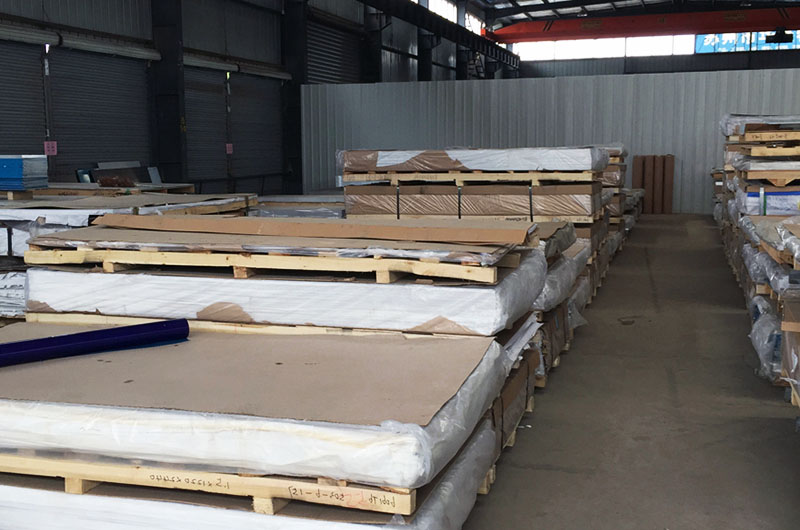
Haomei Aluminum Offers 7049 Aluminum
| Product | Description |
| 7049 Aluminum Forgings | 7049 aluminum forgings are made by shaping the material under high pressure, offering excellent mechanical properties such as high strength, toughness, and resistance to fatigue. This makes them ideal for aerospace and structural applications requiring high-performance alloys. |
| 7049 Aluminum Round Bar | 7049 aluminum round bars are extruded or forged into cylindrical shapes. These bars are commonly used in aerospace, automotive, and marine applications where high strength and corrosion resistance are crucial, and are often used for structural parts and shafts. |
| 7049 Aluminum Flat Bar | 7049 aluminum flat bars are characterized by their flat, rectangular shape, providing excellent versatility. These are used in a wide range of structural applications, including frames, supports, and in aerospace components that demand both strength and lightweight properties. |
| 7049 Aluminum Rectangular Bar | Similar to flat bars, 7049 aluminum rectangular bars have a thicker cross-section, offering even greater load-bearing capacity. They are used in structural engineering, aerospace, and manufacturing industries, especially in applications requiring high strength-to-weight ratios. |
| 7049 Aluminum Rolled Rings | Rolled rings made from 7049 aluminum are produced by heating and rolling the aluminum into ring-shaped components. These are commonly used in aerospace and heavy industries where precision, strength, and durability are essential for applications like turbine engines or structural supports. |
| 7049 Aluminum Forged Rings | Forged rings are made by compressing the 7049 aluminum alloy into ring shapes under high pressure. These forged rings have superior mechanical properties, including high strength and fatigue resistance, making them ideal for demanding aerospace and automotive applications. |
| 7049 Aluminum Sheet | 7049 aluminum sheets are thin, flat pieces of aluminum produced through rolling or extrusion. These sheets are commonly used in manufacturing and aerospace sectors due to their high strength, good machinability, and excellent corrosion resistance, ideal for skin panels, fuselage sections, and structural parts. |
| 7049 Aluminum Plate | 7049 aluminum plates are thicker than sheets and offer excellent strength and toughness. These plates are used for critical aerospace, automotive, and structural components that need to withstand high loads, stress, and wear. |
| 7049 Aluminum Extrusion | 7049 aluminum extrusions are shapes produced by forcing the aluminum through a die to create custom profiles such as beams, channels, and frames. These extrusions are widely used in aerospace, automotive, and construction industries due to their adaptability and high strength-to-weight ratio. |
| 7049 Aluminum Extrusion Angles | 7049 aluminum extrusion angles are formed into L-shaped profiles that offer high structural support. They are used in structural frameworks, supports, and reinforcement applications, particularly in aerospace and manufacturing industries. |
| 7049 Aluminum Billet | 7049 aluminum billets are solid, cylindrical forms of aluminum that serve as raw material for further processing, including extrusion, forging, and machining. These billets are prized for their high strength and resistance to stress, making them suitable for a wide range of precision applications. |
| 7049 Aluminum Ingot | 7049 aluminum ingots are cast blocks of aluminum that are typically used as starting material for further processing into more refined products such as billets, sheets, and plates. The alloy’s high strength and durability make it suitable for industrial and aerospace manufacturing. |
| 7049 Aluminum Machined Parts | 7049 aluminum machined parts are components that have been precisely cut or shaped using machining processes. These parts are used in applications that require tight tolerances, high strength, and excellent fatigue resistance, particularly in aerospace, automotive, and defense sectors. |
7049 Aluminum Processing and Heat Treatment
- Formability: 7049 is primarily processed by forging. It is hot worked in the range of approximately 720°F to 820°F (382°C to 438°C) to achieve the desired shape.
- Heat Treatment: 7049 alloy undergoes solution heat treatment (typically around 468°C or 875°F), followed by water quenching, and then aging (natural aging or artificial aging) to precipitate fine particles, thereby increasing its strength and hardness.
- Workability: After proper heat treatment, 7049 can be easily machined; however, welding is generally avoided as heat can reduce its stress corrosion cracking resistance. If welding is required, specialized techniques (such as TIG welding under controlled conditions) can be used.
- Weldability: 7049 aluminum alloy has poor weldability, but it can be improved by using appropriate welding materials and techniques.
7049 Aluminum Compared to Similar Alloys
- 7075: The zinc content in 7049 is higher, leading to higher strength; 7049 has better stress corrosion cracking resistance.
- 7050: Optimized for thick sections; 7049 is suitable for various structural applications.
| Comparative Alloy | Description |
| Comparison with 7075 Aluminum Alloy | 7049 Aluminum has slightly lower zinc content compared to 7075 aluminum alloy, but its strength is still very close, and it has higher stress corrosion cracking resistance. While 7075 aluminum alloy is widely used in high-strength aerospace structures, 7049 is particularly suitable for aerospace components and structures exposed to extreme environments due to its superior stress corrosion cracking resistance. The stress corrosion cracking performance of 7049 allows it to better withstand environmental impacts, prolonging its service life while maintaining high strength. |
| Comparison with 7050 Aluminum Alloy | 7049 Aluminum has similar applications to 7050 aluminum alloy but is more versatile. 7050 aluminum alloy is primarily designed to optimize the performance of thick-section aluminum materials, providing better resistance to crack propagation in thicker sections. 7049, on the other hand, is more versatile and suitable for various structural applications, whether thin or thick sections, offering excellent performance in both. The versatility of 7049 aluminum alloy makes it a flexible and reliable choice for aerospace and other high-performance structural components. |
7049 Aluminum Limitations
- Corrosion resistance is lower than 5xxx/6xxx alloys; protective treatment is required.
- Welding is more difficult compared to non-heat treatable alloys.
7049 Aluminum Manufacturing Considerations
- Machining: Due to its high strength, hard carbide tools are required.
- Welding: Challenging; it is recommended to use friction stir welding or specialized filler alloys.
- Corrosion protection: May require coatings/anodizing in harsh environments.
7049 alloy is ideal for applications demanding high performance under pressure, especially where weight reduction is critical. Proper heat treatment and manufacturing techniques are crucial to maximize its performance.

